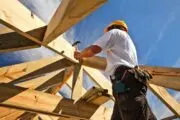
The Canadian government has proposed more than $10.1 billion until 2027 to build new homes and introduce policies that will support the country’s housing market in its latest budget.
On Thursday, April 7th, Deputy Prime Minister and Minister of Finance Chrystia Freeland presented the 2022 budget to the House of Commons.
As the cost of living climbs and the price of homes continues to rise across Canada, the budget outlines specific spending dedicated towards the creation of new housing, tax credits and new policies that target market speculation.
“Housing is a basic human need, but it is also an economic imperative. Our economy is built by people, and people need homes in which to live. But here’s the problem — Canada does not have enough homes,” said Minister Freeland in her budget speech. “We need more of them, and fast. This budget represents perhaps the most ambitious plan that Canada has ever had to solve that fundamental problem.”
Here are some of the highlights from the 2022 budget.
Spending proposed towards creation of new homes
A significant portion of the budget’s housing funds will go towards the creation of new residences.
Starting in 2022-2023, the budget proposes $4 billion over five years to the Canada Mortgage and Housing Corporation (CMHC) towards the launch of the new Housing Accelerator Fund which will support municipal planning and delivery processes to speed up housing development. This new fund would deliver 100,000 net new housing units over the next five years.
Another $1.5 billion is proposed over two years to the CMHC starting in 2022-2023 to extend the Rapid Housing Initiative, which would create at least 6,000 new affordable housing units. Twenty-five per cent of the funding would go towards women-focused housing projects.
The budget suggests $2.9 billion in funding under the National Housing Co-Investment Fund to accelerate the creation of up to 4,300 new units and the repair of up to 17,800 units for vulnerable Canadians. About $500 million in funding on a cash basis would be reallocated from the same fund to launch a new Co-operative Housing Development Program that would expand co-op housing. Another $1 billion in loans would be used from the Rental Construction Financing Initiative for co-op housing projects.
Over two years, $150 million is proposed to support affordable housing and related infrastructure in Canada’s northern communities. Beginning in 2024-2025, $562.2 million is proposed over two years for Infrastructure Canada to provide doubled annual funding for Reaching Home: Canada’s Homelessness Strategy. Over the next three years, $62.2 million would be given to Infrastructure Canada, with support from Veterans Affairs Canada, to launch a new Veteran Homelessness Program.
A total of $350 million is proposed over five years to Natural Resources Canada to develop the Canada Green Buildings Strategy and the Deep Retrofit Accelerator Initiative to support building code reform and support for retrofit audits.
“But on housing, I would like to offer one caution: There is no one silver bullet which will immediately, once and forever, make every Canadian a homeowner in the neighbourhood where they want to live,” said Minister Freeland.
“As Canada grows—and as a growing Canada becomes more and more prosperous—we will need to continue to invest, year after year after year, in building more homes for a growing country,” she added.
New savings account announced for first home purchases
For those looking to save for down payment or create a secondary suite, new financial support has been proposed under the budget.
Prospective homebuyers would be able to generate up to $40,000 in savings towards their first property through a proposed Tax-Free First Home Savings Account. Similar to a Registered Retirement Savings Plan (RRSP), contributions to the savings account would be tax-deductible. Withdrawals to purchase a first home would be non-taxable like a Tax-Free Savings Account (TFSA.)
Over five years, the Tax-Free First Home Savings Account would provide $725 million in support, according to the 2022 budget.
In 2022-2023, the budget has recommended $475 million in one-time $500 payment to those facing housing affordability challenges. The budget also proposes doubling the First-Time Home Buyers’ Tax Credit to $10,000. This would offer up to $1,500 in support to home buyers and applied to homes bought on or after January 1st, 2022. The qualifying expense limit of the Home Accessibility Tax Credit would also be doubled to $20,000 for the 2022 and following tax years.
Starting next year, a multi-generational home renovation tax credit would give up to $7,500 in financial support towards building a secondary suite for a senior or an adult with a disability. This refundable credit would allow families to claim 15 per cent of up to $50,000 in renovation and construction costs.
Restrictions slated for anti-flipping and foreign ownership
Some of the policies and proposals outlined during the 2021 federal election were highlighted in this year’s budget.
The 2022 budget announced that the Minister of Housing and Diversity and Inclusion will “engage with provinces and territories over the next year to develop and implement a Home Buyers’ Bill of Rights.” This includes plans to end blind bidding, ensure a legal right to a home inspection and provide home price transparency. This proposal was originally announced during the Liberal party’s federal election campaign.
The budget reinforced the federal government’s intentions to propose restrictions on foreign home ownership, another policy floated during fall’s election season. The policy would prohibit foreign commercial enterprises and non-Canadian citizens or permanent residents from acquiring non-recreational, residential property in the country for two years. Refugees and those authorized for emergency travel to Canada while fleeing international crises would be exempt.
In this year’s budget, new rules would be introduced so that anyone who sells a property that they’ve held for less than 12 months would be subject to full taxation on their profits as business income. This would come into effect on residential properties sold on or after January 1st, 2023. Some exceptions would be made in certain circumstances, such as the birth of a child, a new job or death.
All assignment sales of newly-constructed or substantially renovated residential housing would be taxable for GST/HST purposes effective May 7th, 2022.






